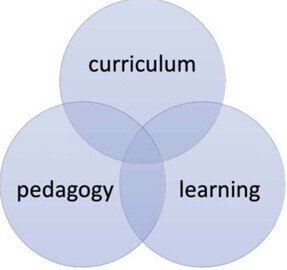Pedagogy at St Edburg's
Pedagogy: the way that the teacher delivers the content of the curriculum
The delivery of each curriculum subject is underpinned by pedagogical research with a strong evidence base and proven impact
See below for more detailed pedagogy in each subject.
St Edburg's Pedagogy Essentials
At St Edburg's we offer high quality CPD which ensures we deliver the highest quality teaching and learning experience for our children. Our approach is influenced by elements of Teaching for Mastery, the NACE core principles, Rosenshine, EEF research and the SOLO Taxonomy Scale (Structure of Learning Outcomes). See below for St Edburg's Pedagogy Essentials model.
The Five-A-Day Principle
Recent research (EEF, March 2020) suggests that there are approaches which teachers can employ to support learning and improve outcomes for all pupils, including those with Special Educational Needs.
The evidence which informed the EEF’s report ‘Special Educational Needs in Mainstream Schools’ indicates that there are five particular approaches which can be integrated into day-to-day teaching practice to raise attainment among children with additional needs, as well as their classmates. The ‘Five A Day’ principle underpins our approach to teaching and learning across the school.
Rosenshine’s Principles of Instruction
At St Edburg’s, Rosenshine’s principles underpin our approach to teaching and learning in order to enable our students achieve their full potential.
Rosenshine's principles of instruction (2010) are grounded in a solid evidence base derived from three sources:
- Cognitive science research
Focusing on how the human brain acquires and uses new information - the importance of giving students sufficient time to practise retrieval, ask questions, and get the desired help. Students must continue to rehearse their learning by summarising, analysing and applying their knowledge.
- Direct observation of ‘master teachers’
Teachers whose students made the most academic progress focused on aspects such as how they presented new information and made explicit links to prior learning.
- Research of scaffolding
The use of models and instructional procedures helped students to learn complex tasks.
Rosenshine explored teacher instruction in detail, and identified the approaches and strategies that were features of the most successful teachers’ practice. From this he formulated ten key principles, which he argued underpin an effective approach to instruction in lessons.
Click here for more information about Rosenshine’s Principles of Instruction
































